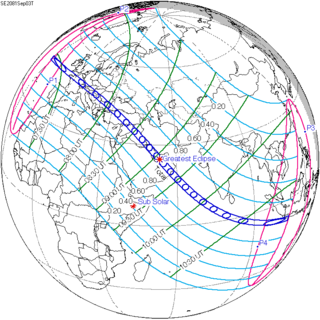| Solar eclipse of September 3, 2081 | |
|---|---|
| Type of eclipse | |
| Nature | Total |
| Gamma | 0.3378 |
| Magnitude | 1.072 |
| Maximum eclipse | |
| Duration | 333 s (5 min 33 s) |
| Coordinates | 24°36′N 53°36′E / 24.6°N 53.6°E |
| Max. width of band | 247 km (153 mi) |
| Times (UTC) | |
| Greatest eclipse | 9:07:31 |
| References | |
| Saros | 136 (41 of 71) |
| Catalog # (SE5000) | 9690 |
A total solar eclipse will occur at the Moon's descending node of orbit on Wednesday, September 3, 2081,[1] with a magnitude of 1.072. A solar eclipse occurs when the Moon passes between Earth and the Sun, thereby totally or partly obscuring the image of the Sun for a viewer on Earth. A total solar eclipse occurs when the Moon's apparent diameter is larger than the Sun's, blocking all direct sunlight, turning day into darkness. Totality occurs in a narrow path across Earth's surface, with the partial solar eclipse visible over a surrounding region thousands of kilometres wide. Occurring about 5 hours before perigee (on September 3, 2081, at 14:05 UTC), the Moon's apparent diameter will be larger.[2]
The path of totality will be visible from parts of France, Germany, Switzerland, Liechtenstein, Austria, Italy, Slovenia, Croatia, Hungary, Bosnia and Herzegovina, Serbia, Romania, Bulgaria, Turkey, Syria, Iraq, Kuwait, far western Iran, Bahrain, Qatar, the United Arab Emirates, eastern Saudi Arabia, Oman, the Maldives, and southern Indonesia. A partial solar eclipse will also be visible for parts of Greenland, Europe, North Africa, Northeast Africa, the Middle East, Central Asia, South Asia, and Southeast Asia.
- ^ "September 3, 2081 Total Solar Eclipse". timeanddate. Retrieved 23 August 2024.
- ^ "Moon Distances for London, United Kingdom, England". timeanddate. Retrieved 23 August 2024.
